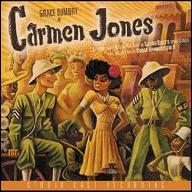Bumbry's 1963 London debut came in the role of Princess Eboli in Verdi's Don Carlos, and she gave her first Metropolitan Opera performance in the same role in 1965. Among the other roles she undertook were those of Lady Macbeth in Verdi's Macbeth and Carmen in Bizet's opera. She had unequivocally established what should have been obvious thirty years earlier in connection with her great predecessor Marian Anderson, namely, that vocal artistry, not race, matters in the casting of operatic roles. During the 1960s Bumbry worked on extending her range. In 1970 at the Vienna Staatsoper, she sang the part of Santuzza, making her debut as a soprano. She sang Richard Strauss's Salome at Covent Garden the same year, and her first appearance in Puccini's Tosca at the Metropolitan Opera came in 1971. She maintained her mezzo voice while triumphing in soprano parts, such as Jenufa in Janacek's opera, and as Ariane in Dukas' Bluebeard. Between operatic performances she established a fine recital career, stressing the core repertory of German lieder. Her attractions as a performer include a commanding stage presence with an effective and understated acting technique. She has a very warm voice with rich tone quality throughout the mezzo range, although it loses some of its distinctiveness in the very upper part of her soprano register. She is among the few sopranos who have sung both the roles of Aida and Amneris in Aida and both Venus and Elisabeth in Wagner's Tannhäuser. ~ Joseph Stevenson, Rovi
Grace Bumbry
from St. Louis, MO
January 4, 1937 (age 87)
Biography
Grace Melzia Ann Bumbry was born in St. Louis, Missouri, USA, on January 4, 1937. As a youth she sang in church choirs. In 1955 she entered Northwestern University, where she studied voice with the great Lotte Lehman, and transferred with her to the Music Academy of the West in Santa Barbara, California. In 1958 she was joint winner of the Metropolitan Opera auditions, sharing first place with Martina Arroyo. She won some other prizes, and made her professional debut in a recital in London in 1959. Her first operatic appearance was at the Paris Opéra, as Amneris in Verdi's Aida. It was one of the most spectacular operatic debuts in history; Bumbry became an instant star and was invited to join the roster of the Basle Opera. She made operatic history in 1961 when she was engaged by Wieland Wagner to sing at the Bayreuth Festival and became the first black singer to perform in the shrine of Wagnerian opera. Furthermore, musical historian Nicolas Slomimsky has pointed out that she was the first African American to make a professional operatic as a goddess, for her debut at Bayreuth was as Venus in Tannhäuser, July 23, 1961. Bumbry embarked on a concert tour of the United States and was invited by Jacqueline Kennedy to sing at the White House, on February 20, 1962. She also followed up her smash success at Bayreuth with appearances as Venus at the Chicago Lyric Opera and at Lyons, France.
Top Tracks
Albums
Videos
Close

















